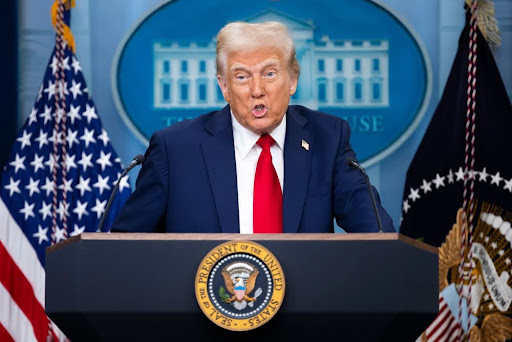Wall Street reacts as ‘Liberation Day’ approaches and recession fears mount.
Market Jitters Spread Worldwide
Stock markets worldwide began the week with sharp losses as investors braced for President Donald Trump’s “Liberation Day”—a new phase of tariff impositions set to begin on April 2. The uncertainty surrounding the extent and economic impact of the upcoming tariffs has rattled confidence from Wall Street to Wellington, triggering widespread sell-offs.
In New York, the S&P 500 fell 0.6%, adding to what may become its worst quarter in nearly three years, with a cumulative loss of nearly 6% since the start of the year. The Nasdaq composite dropped 1.6%, dragged down by steep losses in Big Tech stocks such as Tesla and Nvidia, while the Dow Jones Industrial Average briefly recovered, gaining 43 points in late-morning trading.
Global markets mirrored the volatility:
- Japan’s Nikkei 225 plunged 4%
- South Korea’s Kospi dropped 3%
- France’s CAC 40 fell 1.6%
- New Zealand’s NZX 50 slipped a more modest 0.1%
The broad sell-off reflects mounting fears that Trump’s trade policy, especially his planned “reciprocal tariffs,” could fuel inflation and hamper global economic growth.
Tariff Fears and Economic Uncertainty Deepen
Trump’s latest round of tariffs is expected to target countries based on what the administration views as imbalanced trade practices, including differing tax burdens. While specific details remain unclear, Goldman Sachs economists estimate a 15% average tariff, leading the firm to raise its inflation outlook and cut its growth forecast for the U.S. economy.
According to Goldman, the chance of a recession within the next year has risen to 35%, up from 20%. Factors contributing to this outlook include:
- Slowing consumer and business confidence
- Policy uncertainty
- Indications from the White House that it is willing to tolerate economic pain to meet its trade goals
While the tariffs may aim to revive U.S. manufacturing, the risk is that businesses, faced with unpredictability, might scale back hiring or investment, potentially triggering the very downturn policymakers hope to avoid. Analysts at Morgan Stanley caution that April 2 may not resolve the uncertainty and could become a “stepping stone” toward prolonged negotiations.
“Policy uncertainty and growth risks are likely to persist—it’s a question of to what degree,” wrote Morgan Stanley strategist Michael Wilson.
Big Tech and Travel Stocks Lead Market Losses
The sharpest declines were seen in Big Tech, as concerns mount over high valuations and sensitivity to economic disruption.
- Tesla fell 4.7%, extending its year-to-date loss to 37.8%. Once buoyed by speculation about CEO Elon Musk’s close ties to Trump, the stock has since plummeted, returning to its pre-election levels.
- Nvidia dropped 4.1%, bringing its year-end loss to 21.7%, despite ongoing enthusiasm about the AI market.
Tesla faces a growing political backlash, with Musk now at the center of budget-cutting debates and protests targeting its showrooms. The brand’s public image and perceived alignment with Trump have likely exacerbated investor concerns.
Companies tied to discretionary spending also suffered, reflecting worries that households may cut back:
- United Airlines lost 4.8%
- Delta Air Lines fell 2.8%
Meanwhile, investors turned to safer assets amid the uncertainty.
- Gold prices briefly surpassed $3,160 per ounce.
- Treasury bond prices rose, pushing the 10-year yield down to 4.22%, from 4.27% on Friday and 4.80% in January.
On the upside, mortgage company Rocket announced it would acquire home loan servicer Mr. Cooper in an all-stock deal valued at $9.4 billion. Mr. Cooper’s stock soared 16.6%, while Rocket fell 7.8% following its recent acquisition of real estate listing platform Redfin.
Outside the U.S., markets also reacted to unrelated domestic shocks. In Thailand, a strong earthquake centered in Myanmar destroyed the region. Shares in Italian Thai Development, whose under-construction 30-story high-rise collapsed during the quake, plummeted 26.9%, with dozens of workers missing. Thai authorities have launched an investigation into the collapse.


